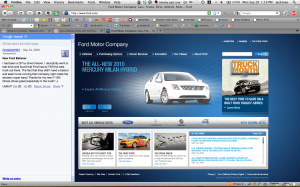In previous post on the illusory but often sought “brand control on the internet” I talked about Squidoo’s Brands in Public and GetSatisfaction.
Google’s new offering, SideWiki, makes Brands in Public look very web 1.0. Why make consumers come to a third party site just to see all the comments about a brand, when you could put them right next to the brand’s site?
SideWiki, which requires installation of the Google Toolbar, lets you add comments to any web page. You can comment on the page as a whole or on specific highlighted text within the page.
Here, for example, is the Ford Motor Company home page with SideWiki showing (click for full size):

Those of you who’ve been “on the internet” for a while will recognize the concept – it’s not really a new idea, having been tried by Third Voice (in 1999!), Me.dium, and even Microsoft (“Smart Tags” anyone?).
However, it now has the force of Google behind it – and it links those comments to your Google Profile, providing a nice centralized view of your activity, as well as the ability to share those comments via email, Twitter, and Facebook.
Will brands rebel, chafing at the idea of random internet users leaving post-its all over their carefully controlled and designed brand presences? (See the discussion at Google Webmaster Help – only way is to block all users with the Google Toolbar, which is rather like cutting off one’s nose to spite one’s face).
Will brands embrace the opportunity, adding SideWiki into their social media monitoring tools, responding to comments, and claiming the top spot on all their pages? (Sidewiki allows the page owner to rank comments, including putting the official page owner note at the top of the list).
Jeff Jarvis at first saw Danger in Sidewiki, writing:
Google is trying to take interactivity away from the source and centralize it. This isn’t like Disqus, which enables me to add comment functionality on my blog. It takes comments away from my blog and puts them on Google. That sets up Google in channel conflict vs me. It robs my site of much of its value (if the real conversation about WWGD? had occurred on Google instead of at Buzzmachine, how does that help me?). On a practical level, only people who use the Google Toolbar will see the comments left using it and so it bifurcates the conversation and puts some of it behind a hedge. Ethically, this is like other services that tried to frame a source’s content or that tried to add advertising to a site via a browser . . . .
So this goes contrary to Google’s other services – search, advertising, embeddable content and functionality – that help advantage the edge. This is Google trying to be the center.
One can definitely see Google asserting a direct relationship with the end user here, and disintermediating the hosting site – whether you provide comments or not Sidewiki will provide them for you.
It feels different than Disqus or the other examples since it happens “on” your domain – or at least appears to. Is there some fundamental line crossed when third parties operate on your domain without your consent?
If so, what about GreaseMonkey, or AdBlock Plus, or Stylish, or any of the other browser plugins which change the look and feel or functionality of sites?
Sidewiki is yet another reminder that the user is in control of the experience, not the marketing team – how will brands react?
There’s no question that this means that more options are being given to the consumer to make themselves heard. It also means that we as brands need to be aware of what’s being said and decide how to effectively respond.
While the option is there, the ability of a webmaster to place a statement on the Sidewiki is of little comfort. The conversation on the side still takes place, whether the brand wants it to or not. The key is how companies can monitor this and how they choose to engage.
Scott Monty
Global Digital Communications
Ford Motor Company
@ScottMonty